Link
It's hard to find Lithuanian resources, and this course by @aro-langblr is a great one. If you don't know anything about Lithuanian, why don't you give a peek to this course and see what the language sounds and looks like. Learn to say hello or thank you. Lithuania is an often forgotten country, but there's many more people there than you think, and learning a few words could help you make a friend some day :)
just a reminder that I have completed my lithuanian A1 course on memrise; it’s available for all to use
9 notes
·
View notes
Text
Oops. Just made a commitment with @langblrblunder to start learning Latvian when he starts learning Lithuanian. Hahahahahha (not like I have schoolwork or anything)
5 notes
·
View notes
Note
So I tried out Clozemaster for a few weeks, with plans to make a post about it (but never got around to), but I can talk about it now.
I tried it with Spanish, Italian, and Irish, three languages that had different levels of content on the website. Spanish had a high level of content, Italian had a mid-to-high level, and Irish had a mid-to-low level. Spanish and Italian worked fine and I thought it was actually very helpful to see real sentences and word-by-word translations, but I ran into a lot of problems when using Irish.
Firstly, the website appears to just scalp websites for sentences and translations, so there's no guarantee that any are accurate. It somewhat has user submitted edits, but it only allows those who pay for membership to propose edits to questions and translations. I saw several Irish mistranslations/misspellings that I was unable to fix because I didn't pay.
Secondly, and this may have been a problem with Irish more than other languages, but several translations weren't literal, which is a big problem when the website's goal is to show you literal translations.
Finally, I did think the website was really good, mostly for mid-level learners, or those who aren't likely to trip up on most of the basic grammar. The problem with this is that by the time you get to this point, you probably know enough vocab to not get as much out of this site.
TLDR; Clozemaster is pretty much only good for languages that are popular enough to have large communities on the website, but most popular languages can probably find better resources out there.
Have you ever tried Clozemaster? I think they have a few minority languages (Māori included)
Never heard of it! Though I did look it up just now, and yes they do have Māori, but it says that it’s only for intermediate learners, so something to keep in mind for the future. Thanks!
Edit: I’m trying it out now for Serbian and it seems awesome so far!
19 notes
·
View notes
Text
Just watched Eurovision 2009, and I'm so sorry Armenia..... you deserved so much better...
2 notes
·
View notes
Text
I’m currently in a Russian History class, and I am SO GLAD that my roommate still knows a bit of Russian from when he was learning it because I can go and ask him like some super simple question that the book assumes I already know. Like at some point I had to ask if kontsy was the plural of konets because the book only defined one of them.
0 notes
Text
If your teacher doesn’t let you turn assignments in late, that means they care more about your grade than your learning, which makes them a bad teacher.
0 notes
Text
Just learned that adjective/noun order isn’t nearly as fixed in Italian as I expected, and when I looked it up, that’s apparently also true in Spanish. Adjectives can even have different semantic meanings when they’re before or after the noun. How did I never know this? Did I go through 5 years of Spanish class in high school and never see an adjective before a noun or did I just pay no attention to that at all?
5 notes
·
View notes
Text
School is back in session, and I’m absolutely swamped, but I found out that my university offers free access to the online version of Colloquial Irish 2, so I may take some time to study that. I’ve been looking for some Irish textbooks to study, so if anybody has suggestions for anything that you’ve used, that would be great! :)
1 note
·
View note
Photo


“The question is can we bring back some of the performative power, the intimacy, of those voices? Can we bring them back to life?” Lamberto Coccioli, the project lead and associate principal of Royal Birmingham Conservatoire, said. His team will collaborate with three European contemporary music ensembles and Cambridge University’s department of Anglo-Saxon, Norse and Celtic. The goal is to produce musical compositions, public concerts, conference presentations, a digital audio database and a sample library.
Archaeologists have found evidence of musical instruments dating back to the Iron Age, including horns, panpipes, flutes and lyres, but Vikings and early Celts left scant written record of their tunes. Scholars are confident they know what Vikings and Celts sounded like by tracing the evolution of language and pronunciation, said Coccioli. “The knowledge is there but it’s academic knowledge and not used in artistic practice. We thought we might be able to take the source material for new compositions, not just [recreate] the raw sounds.”
[source]
2K notes
·
View notes
Text
reading posts about “big european languages” is completely alienating for me because apart from *ME*, who’s speaking about neapolitan? who knew about neapolitan? who’s creating content in neapolitan? in the discussion of european languages vs. languages spoken outside of europe where do i stand?
19 notes
·
View notes
Text
@langblrblunder wanna do this with me?
@language-sanctuary’s langblr study challenge
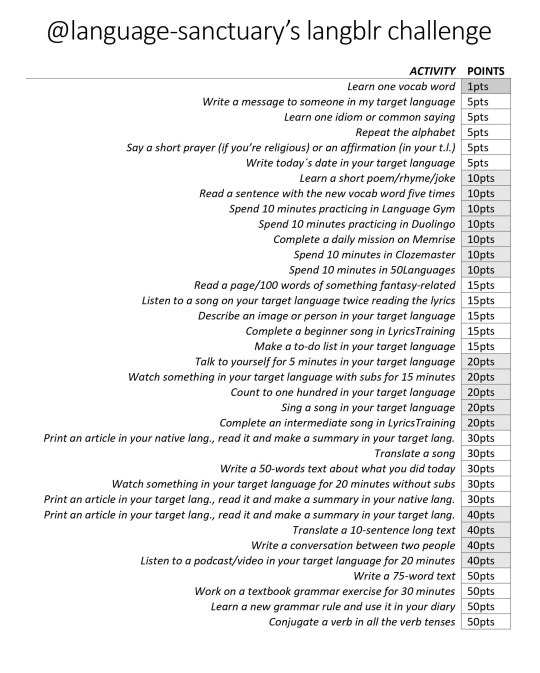
This is my personal method to language studying, I thought it would be helpful. A link to a PDF can be found here
How this works:
Language studying consists of fours skills: writing and speaking (active skills) and reading and listening (passive skills). I have compiled a list of language learning activities that provide a comprehensive approach to those fours skills and can be useful to visual, auditory or kinesthesic learners (or a mix).
You can set an estimate of the points you’ll get in week or day, or even try to improve a previous score.
You can try to go though the list in order
You can print the list, stick it to the wall and throw darts at it, just have fun!
If you use this, please tag it as #karenstudymethod or tag @language-sactuary so I can see the posts!
599 notes
·
View notes
Text
Reblogging this mostly for my own benefit.
Grammar
So I’ve put a few grammar notes of this blog so far, so i thought i’d catalogue them a bit
Pronouns TA
Caol le Caol Leathan le Leathan
Mutations
Gender and Nouns
Regular Verbs
Present Tense 1
Present Tense 2
Present Tense 3
Present Tense 4
Present Tense 5
Past Tense 1
Past Tense 2
Past Tense 3
Past Tense 4
95 notes
·
View notes
Photo

A great article by Simon McGarr titled The Gist: Should Ireland's Broadcasting Regulators rule the Internet?
It’s all about the BAI’s shady attempt to regulate the Internet while we’re all distracted by COVID-19. I’d suggest you give it a read.
0 notes
Text
Categorising Romance Languages
One way to classify Romance languages is by looking at what Latin verb is used to express ownership or possession. Some Romance languages express it by using either tenere “to hold” (such as Spanish, Portuguese or Neapolitan) or habere “to have” (such as Italian, Romanian or French).
Medieval Spanish uses both tenere and habere. Tenere expresses physical ownership whereas habere expresses a more abstract possession (such as hunger, thirst, fear, etc.). In later stages of the language, forms of tenere prevailed so that tener is used to express both concepts in modern Spanish. Haber however is used as the auxiliary (helping) verb to build perfect tenses.
Neapolitan uses a similar system but not with every abstract noun. Nouns such as raggiona “reason” and paura “fear” select avé, whereas physical possession select tené/ténere. Avé is also used to construct perfect tenses and express obligation, e.g. aggio visto “I have seen”, aggio ‘a ascì “I have to go out”.
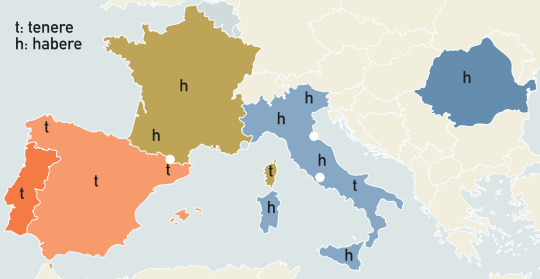
Another way to categorise Romance languages is by looking at which verb is used to express ownership, build perfect tenses, and express existential statements (“there is a woman”). For example, Italian and Romanian use forms of habere for both possession and perfect tenses, but esse to express existential statements. Sardinian, Occitan and French on the other hand would use habere for all three.
Neapolitan is a special outlier: possession is expressed mainly by tenere (and only exceptionally by habere); perfect tenses are mostly built with habere (intransitive verbs however might select esse, like Italian, but not reflexive verbs); and existential statements are made with stare.
Tengo n’aniello “I have a ring”
Aggio vevuto “I have drunk” (cf. M’aggio assettato “I’ve sat down”); Ammo juto “We have gone” (but Simmo jute)
Ce sta n’ommo “there is a man”
288 notes
·
View notes
Text
We LOVE suffering through learning prepositions. At least y’all are suffering with me.

😓
86 notes
·
View notes
Text
This actually seems pretty cool! It has Italian and Spanish, but sadly, there’s no Irish. I’m interested in seeing if it’s any good. Let me know if you try it! :)
We need to talk about LingoHut
I’m supposed to be studying some Italian, but instead, I was googling in my computer how to learn a new language (no, googling how to learn will not teach you shit, you have to sit down and learn your target language not how to do it, I know but I’m lazy.) and I came across LingoHut, and I have to share it.
I don’t know if someone ever talked about this page, but if they did is worth mentioning again.
So basically you go to the website and in the Home Page you have to choose what is your first language and what language are you trying to learn.
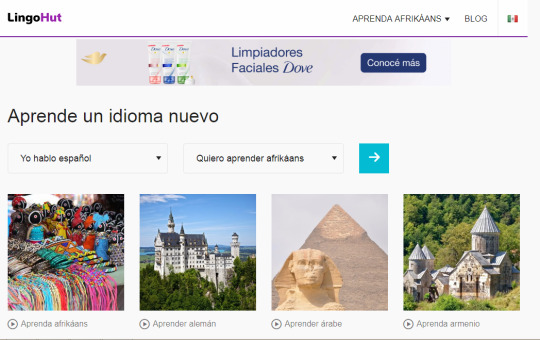
Once you choose it’ll take you to another page in which you have tons of lessons, for ex. In Italian, there are 109 lessons.
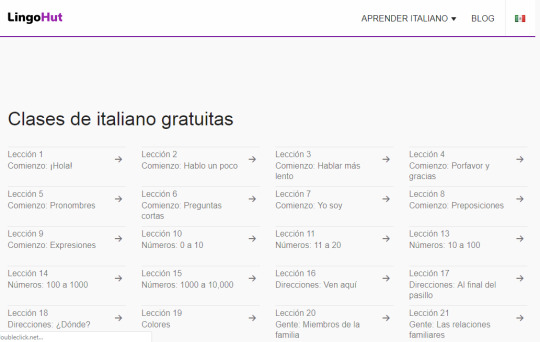
I haven’t checked every lesson yet but for example, the first one is greetings and such. You click that lesson and you have 16 flashcards that will show you the word in your target language and the translation, at the same time that someone pronounces the words.
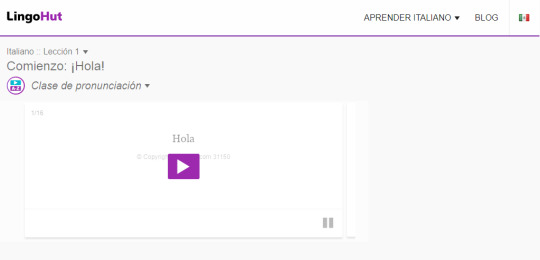
Below the flashcards, you have this ⬇️

And basically is a bunch of game, an easy matching words kind of game, some kind of tic tac toe with words, a memory game do you know the one that kids play in which they have to find the matching pictures? Same but with words and lastly a listening and matching game.
Below the bar of the games, we have the vocabulary list of the words we are taught in that lesson, and you can click the word and listen the pronunciation.
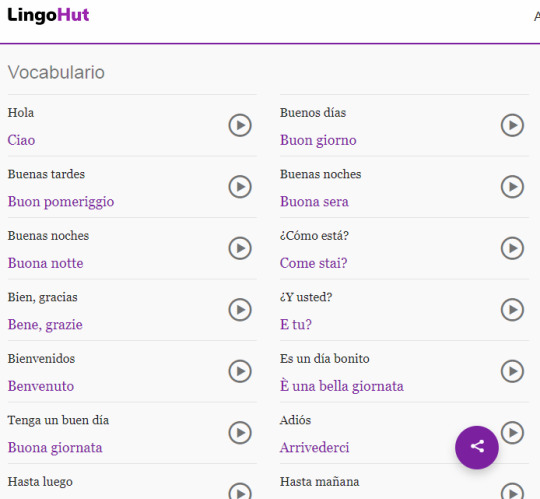
In the end, you have a bunch of the next lessons.
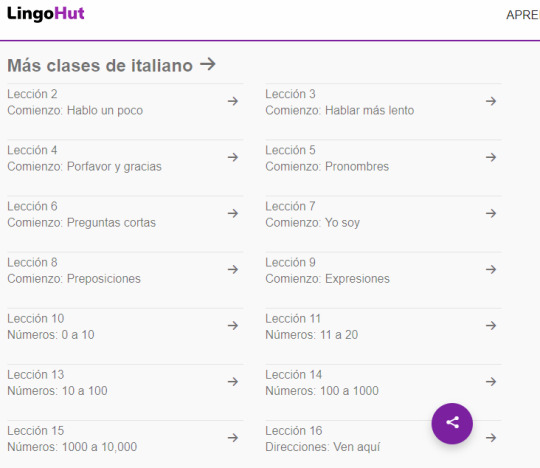
The lessons vary from the content it can be greetings, numbers, health stuff, office words, computer terminology, etc.
The website doesn’t have every language in the world, but it has a lot of them. choose your target language, in my case Italian, and enjoy, is fun and simple if you want to practice or do something related to your target language but you don’t have the willingness that day to study something more consistent like structure.
And the best part is that as far as I went looking around in this page it’s fucking free. Sure, you won’t end the one hundred and something lessons speaking like a native from whatever target language you’re learning, but it can be useful to expand your vocabulary.
11K notes
·
View notes
Text
So I just learned that Irish Sign Language apparently used to have very distinct ‘female’ and ‘male’ signs as a result of the segregation of deaf girls and boys in two different schools. Even most basic concepts like color & kinship terms and the days of the week were often expressed with completely different words.
699 notes
·
View notes